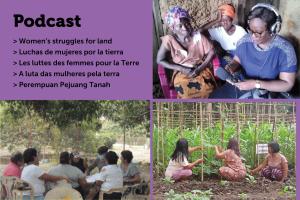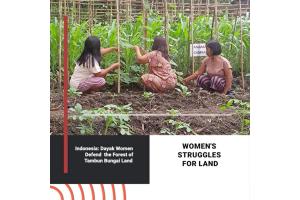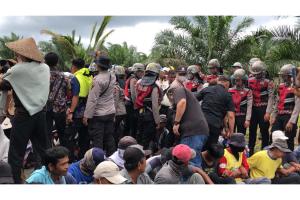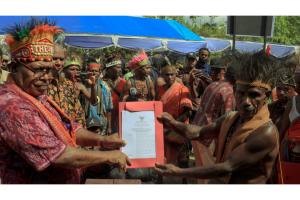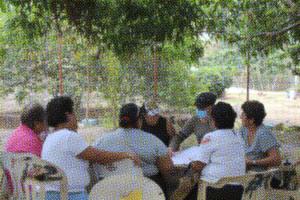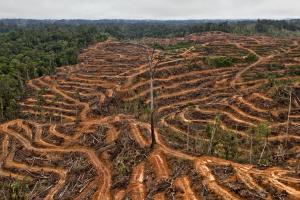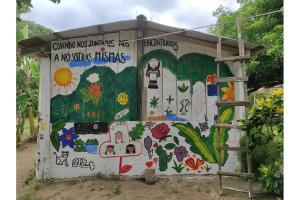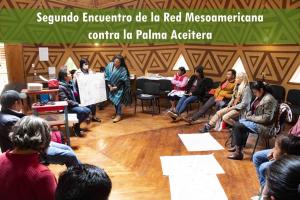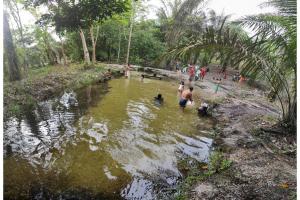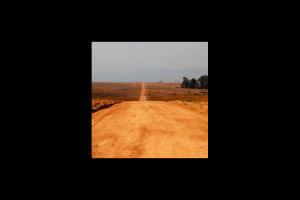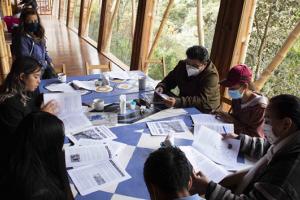Palm Oil
The oil palm tree is native to West Africa. It is an important tree for forest-dependent communities, their cultures and their economies. However, large-scale oil palm monocultures for industrial production (oil and agrofuels) have been driving deforestation and land grabbing in Southeast Asia. More recently, oil palm monocultures are also driving destruction in Africa and Latin America.
Articles
19 March 2025
In the framework of International Women's Day, WRM is relaunching the podcast “Women’s struggles for land”, with stories from women’s collectives from the coastal area of Chiapas in Mexico, the Malen Chiefdom in Sierra Leone and the Kapuas river area of Central Kalimantan in Indonesia. While their stories appear quite different from each other at first glance, we find many commonalities and a strong connection between them.
Bulletin articles
24 October 2024
This article tells the story of a Podcast that is being jointly launched with Solidaritas Perumpuan, a feminist organisation from Indonesia. This espisode is the third in the series “Women’s struggles for land”, produced by WRM together with organisations from different countries. This one tells the story of women's resistance to oil palm plantations, REDD and a large-scale project for food production (Food Estate) in three villages in Central Kalimantan.
Action alerts
10 October 2024
We call groups, organizations and movements to support this letter in solidarity with the farmers defending their territory against the attempts of Wilmar International company to turn their rice fields into industrial oil palm plantations.
Bulletin articles
22 August 2024
Just like the Dutch colonizers in the past did, the Indonesian government, companies and investors consider the land of Papua to be a vast empty territory, a new frontier for extraction and profiteering However, the land of Papua is not empty, but rather home to hundreds of Indigenous Peoples—including the women and men of Kampung Bariat village, who are struggling to ensure control over their ancestral territory and keep it free of oil palm plantations.
Multimedia
28 July 2023
In the state of Chiapas, in southern Mexico, women's organizations are resisting the advance of a monoculture crop that is invading their lands and bringing scarcity and water pollution.
Bulletin articles
22 July 2023
This article tells the story of a women group in Kalimantan called “Hurung Hapakat”, which means “Working Together”. Collectively, and against serious repression, they have reclaimed some land from oil palm plantations in order to also reclaim their food sovereignty, dignity and wisdom. And they are not alone.
Bulletin articles
22 July 2023
Women's organizations are resisting the advance of a monoculture crop that is invading their lands and bringing scarcity and water pollution. In this podcast, they explain their situation and their struggle. The podcast was produced by the groups Women of the Chiapas Coast against Oil Palm and Coastal Women in Rebellion, in collaboration with WRM.
Bulletin articles
16 January 2023
Oil palm plantations are a central cause of deforestation in southeast Mexico. A network of women in Chiapas have organized to denounce the tactics of coercion and deception employed by the State and companies to get peasants to accept this monoculture on their lands. Their struggle is for the land, for their knowledge, and for their voices to be heard.
Other information
11 October 2022
We share the final statement where they express their demands and claims.
Bulletin articles
12 September 2022
There is no other crop that has grown faster globally in the last decade than palm oil. This almost uncontrollable expansion leaves a deep trail of destruction and conflicts around its giant areas of plantations from Southeast Asia to West and Central Africa. As companies take over more community land, they also grab the water sources from them.
Bulletin articles
23 March 2022
Colonial and anti-colonial movements’ have deeply shaped the patterns and impacts of concessions in SE Asia. In some cases, communities have experienced dispossession through land grabs dressed as concessions. In others, concessions are part of a re-concentration of land holding. Either way, the concession model fits well with ideologies of modernisation.
Bulletin articles
17 December 2021
One of the main causes of deforestation in Mesoamerica is the expansion of oil palm monoculture. An exchange of experiences brought together representatives from indigenous and peasant communities to coordinate their resistance.
